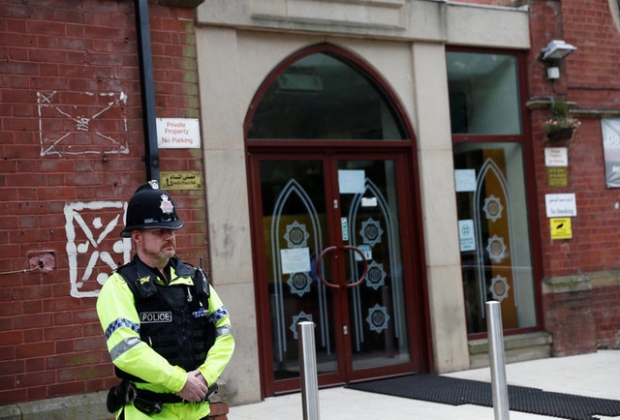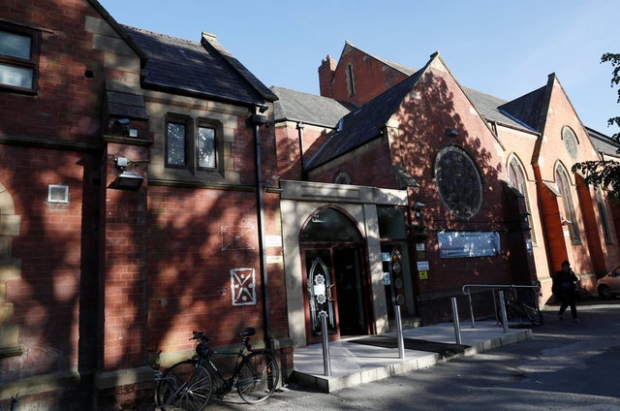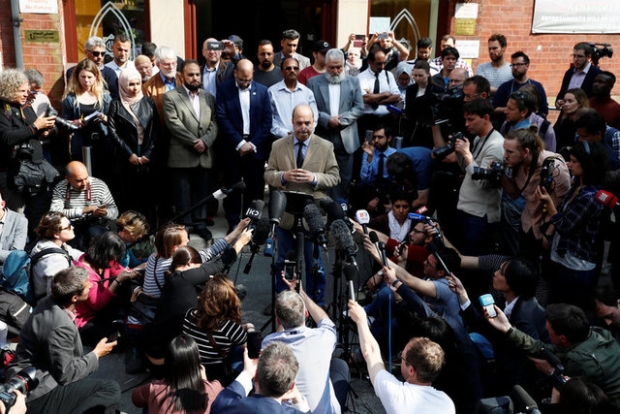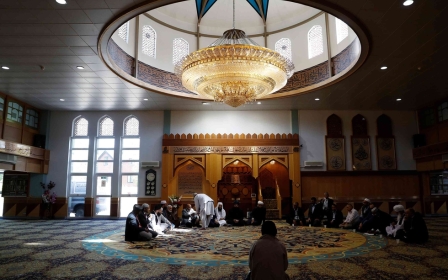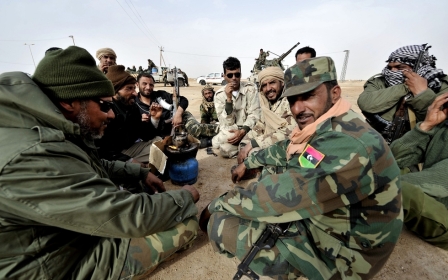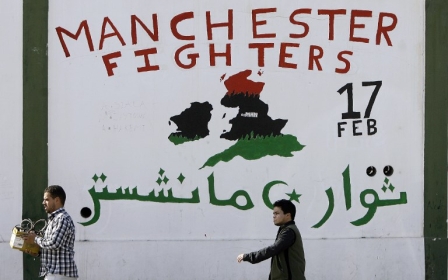Love conquers fear as Didsbury mosque overwhelmed with support
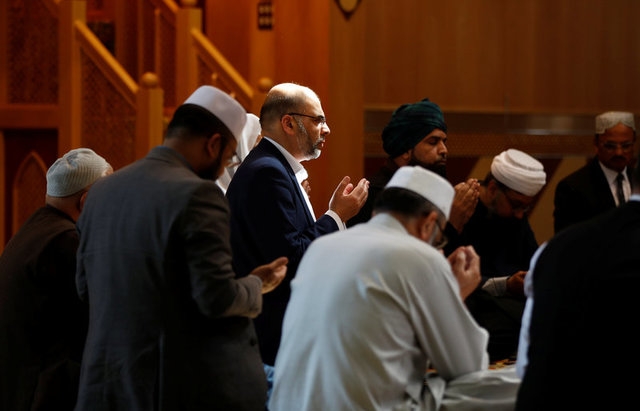
Didsbury, Manchester - The mosque bustles with worshippers waiting for special Ramadan prayers. Groups of boys and girls stand at the main entrance to read piles of messages of support from the wider community, nestled within heaps of bouquets laid by well-wishers.
Just over a week after Salman Abedi killed 22 people in a suicide attack at Manchester Arena, fears of a wedge being driven between Manchester's Muslims and the wider community have been unfounded. At Didsbury, indeed, the effect has been the reverse.
"I've attended Didsbury mosque since I was a child," 25-year-old Laila, a student at Manchester University, told Middle East Eye before 11pm prayers on Tuesday. "I will keep coming because I know this place had nothing to do with the ideas or actions of that bomber."
I know this place had nothing to with the ideas or actions of that bomber
- Laila, worshipper at Didsbury mosque
Ramadan at Didsbury had always been a special time that she enjoyed with her friends and family, she said.
Members of the centre's management said the mosque had received much more support than hate.
"Although the EDL did come by, we've seen an overwhelming amount of support from the wider community," said Sulefa Benali, director of public relations at the mosque.
"We usually receive around 10 non-Muslims every open day, but this Sunday we had around 60 people, all of whom made a point to show their solidarity."
We've seen an overwhelming amount of support from the wider community
- Sulefa Benali, PR director at Didsbury mosque
Hundreds of people have been worshipping at any one time at the mosque, which opens its doors to the community at large every Sunday where groups of visitor from all faiths and non-faiths attend to learn about Islam and the centre's activities.
In a strongly worded statement last week, the mosque called the bombing an act of cowardice and insisted it had worked peacefully at the heart of the community for half a century.
Reports said the bomber regularly attended Didsbury mosque and the Manchester Islamic Centre in the south of the city.
Didsbury's management and members of the community rejected those claims.
"We were deeply shocked and saddened by the incident," Bara Abdul-Salam, an executive board member at Didsbury mosque told MEE.
"We did not think anyone would be making accusations against Didsbury mosque, a place that has always been open to the whole community, both Muslims and non-Muslims."
While Abedi's brother volunteered as a teacher here, and his father carried out the call to prayer before he left for Libya in 2011, Salman himself was rarely seen at the mosque.
"I remember seeing Salman a few times but unlike his father and brother he wasn't a regular," said Mohamed Fadil, a spokesman for the Libyan community in south Manchester and a regular at Didsbury mosque.
"I knew little about him but I remember him as a withdrawn and distant person who had few friends within the Libyan community."
Unfazed Mancunians
Based in a red-brick 19th-century chapel on a leafy street, the mosque has operated since 1967 when the building was bought by donors from the Syrian Arab community. The centre, which includes a prayer hall, library and multipurpose activity hall, acts as both a mosque and community centre.
The congregation includes Muslims from a variety of communities including the Middle East, Africa, Asia and Europe. It numbers many taxi drivers, businessmen and doctors, some of whom helped in the aftermath of the bombing.
One doctor who helped treat victims of the bombing said that he was never concerned about the religious messaging at Didsbury Mosque and does not see link between it and the incident.
"Didsbury has always been a hub for moderation and peacefulness and will continue to be so," said Ahmed, a regular worshipper at the mosque and a junior doctor at the Manchester Royal Infirmary where 32 of the injured victims were treated.
Since the events, police cars have been stationed outside the centre at all times as well as 24-hour police surveillance camera, which Abdul-Salam said was offered by Greater Manchester Police to safeguard worshippers.
Some worshippers were more hesitant to attend to the mosque since the events.
"I felt a little uncomfortable seeing the police cars outside and wondered if I should do my prayers here," said 44-year-old Kamal, a local shop keeper. "But I realised that the police had only come to support us and I knew that I needed to show my solidarity too."
A chief inspector from Manchester police delivered a talk to the congregation following night prayers on Tuesday, and encouraged members of the community to report incidents of Islamophobia.
Libyans in Manchester
Many of Didsbury's mosques attendees hail from Manchester's Libyan community, which numbers in the thousands. Two of the mosques current imams are Libyan as well as many of the former leaders at the centre.
Libya descended into chaos following the Nato-backed toppling of long-time dictator Muammar Gaddafi in 2011, with rival administrations emerging and well-armed militias vying for control of the country's vast oil wealth.
The infighting and lawlessness allowed extremist groups such as IS to seize several coastal regions, creating a stronghold in Sirte until Libyan forces defeated the group in late 2016.
One of the mosque's imams, who is of Libyan origin, Mustafa Graf, posted a statement on Facebook condemning the bombing.
His statement emphasised how events in the Middle East are keenly felt in south Manchester.
"As a community we have lost many hundreds of people who bravely fought and defeated Isis in Sirte, Libya, only a few months ago, and so we are affected by grief again."
Graf was captured and tortured by Gaddafi's forces in 2012 when he visited the country to see his mother.
A deep divide has developed among the various political factions in Libya, with some being supporters of Libyan military strongman Khalifa Haftar in the east of the country.
But the Libyan community in Manchester insists there is divide does not influence daily relations among the community members in Manchester and cannot be used to explain the actions of the bomber.
Sondes, a 35-year-old teacher of Libyan origin said that "Although the political divide in Libya has come to Manchester, it hasn't reached the level of people preaching hate or fighting each other as it has been in Libya."
'I don't see a link between the attack and people who went to Libya in 2011. Some did go to fight but they came back to their normal lives'
- Mohamed Fadil, a spokesman for Manchester's Libyan community
"I've never heard anyone speak in support of IS in the Libyan communities in Manchester," Sondes told MEE.
"Differences in opinion over the situation in Libya don't mean that people have differences of opinion over the actions of the bomber."
Fadil, the spokesman for the south Manchester Libyan communit, agreed.
"Whether you're a supporter of Haftar or not, we all agree that we need to get rid of extremists."
Haftar launched a military campaign dubbed Operation Dignity in May 2014, aimed at rooting out Libya's many rival militant groups, with support from foreign powers, notably Egypt and the UAE.
Reports that Abedi had gone to Libya in 2011 suggested that he had become radicalised during the revolution. But members of the community refuted this narrative.
'Differences in opinion over the situation in Libya don't mean that people will have differences of opinion over the actions of the bomber'
- Sondes, British-Libyan teacher in Manchester
"I do not see a link between the attack and people who went to Libya in 2011," said Fadil.
"People were going to help as doctors, charity workers and translators or to just visit their families. Some did go to fight but they came back to their normal lives."
According to Fadil, it was unlikely that Salman, who would have been 16 at the time, was allowed on the battlefield.
"I was in Libya and I know how they dealt with the under-18s. He might have expressed interest in fighting but it is highly unlikely he was actually allowed to fight," said Fadil.
According to Sarah, a 34-year-old British-Libyan dentist, the Libyan community is well integrated into Manchester.
"Obviously there's a problem and we'd be daft to say there isn't," said Sarah.
"But Manchester is a very multicultural city with Muslims well-integrated and Libyans are especially intertwined," she added.
Middle East Eye propose une couverture et une analyse indépendantes et incomparables du Moyen-Orient, de l’Afrique du Nord et d’autres régions du monde. Pour en savoir plus sur la reprise de ce contenu et les frais qui s’appliquent, veuillez remplir ce formulaire [en anglais]. Pour en savoir plus sur MEE, cliquez ici [en anglais].


